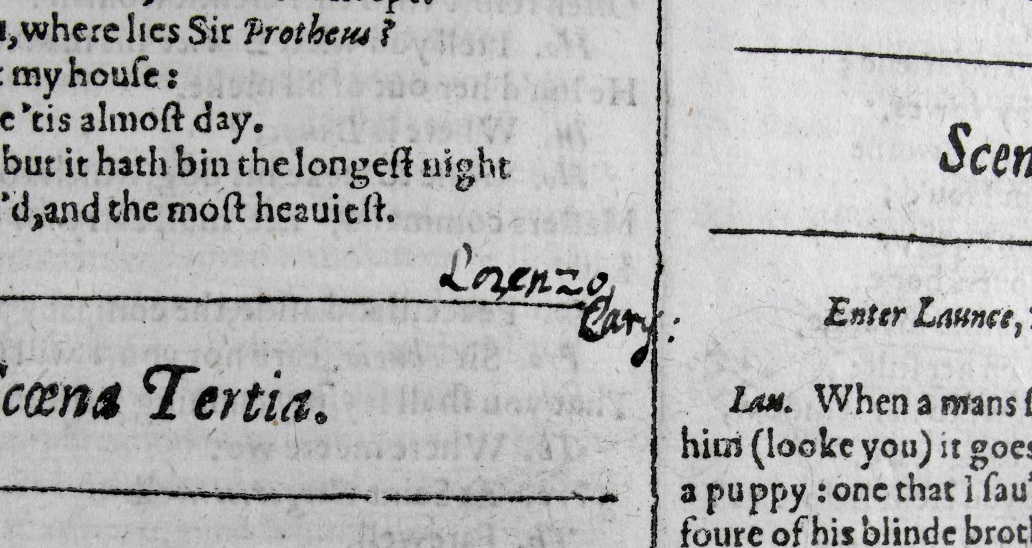The 232 surviving Shakespeare First Folios have been described as ‘the most minutely studied published works in history’. Bibliographers, historians and literary scholars have pored over them identifying previous owners and analysing the various marginalia detailing early readers’ responses to the text.
We have written at length in the past about our own copy – a particularly important example due to its anonymous marginal annotations, which suggest the author actually saw the plays being performed contemporaneously. Now, in an exciting development, a new descriptive catalogue of all surviving First Folios – which looks at each copy closer than ever before – sheds some new light on the anonymous marginal annotations found in our copy.
The clue is in a previously unnoticed handwritten autograph Lorenzo Cary half-way down one of the pages of The Two Gentlemen of Verona. The editors of the new Descriptive Catalogue (Rasmussen and West) suggest that this is probably Lorenzo (also known as Lawrence) Cary (1613-1642), second son of Henry Cary, Viscount Falkland (d. 1633), and Lady Elizabeth Cary (1585-1639). Lorenzo was educated at Exeter College, Oxford before going on to serve in the English army in Ireland. He died in early 1642, leading troops in the Battle of Swords, during the Irish rebellion of 1641. However, Lorenzo is too young to be the author of the contemporary annotations. Rasmussen and West conjecture that Lorenzo’s father, Henry, Viscount Falkland, may be responsible.
Both of Lorenzo’s parents, Henry and Elizabeth, are fascinating figures. Henry grew to public prominence in 1604 as a soldier fighting on the continent, for which his bravery was lauded in an epigram by Ben Jonson. He was captured by the Spanish at the Siege of Ostend, only being released after payment of a hefty ransom. However, these experiences paved the way for his introduction at court and his eventually being named the 1st Viscount Falkland. In 1622 he was appointed Lord Deputy of Ireland (the King’s representative and head of the Irish executive under English rule). During his appointment, Falkland oversaw a considerable expansion in ‘plantation’ – the expropriation of large sections of land from the Catholic Anglo-Irish nobility, to be settled by English and Scottish Protestant settlers. This policy tied in with his strategy of attacking Catholicism in Ireland (he also attempted to expel priests and dissolve religious houses) whilst lining his own pockets. He seems to have been an uncompromising and not altogether likeable figure, apparently describing the Irish lords as:
Like nettles that sting being gently handled, but sting not being crushed.
His wife Elizabeth – Lorenzo’s mother – also seems to have been remarkable. She was a talented linguist, fluent in French and Italian, and was already a successful translator prior to her marriage. Her greatest claim is that she is probably the first female author to write original drama in English (her second play, The Tragedy of Mariam, even seeing publication). Perhaps most remarkably of all, given her husband’s antipathy towards Catholics, Elizabeth openly converted to Catholicism in 1626. Henry was furious, cutting her off financially and forcing her to live in poverty in the hope she would recant. Yet she never did, and on her husband’s death she kidnapped six of her children and spirited them away to Spain to be raised as Catholics!

Two contemporary actors from Shakespeare's 'King's Men' - both 'known' by the annotator (Sp Coll BD8-b.1)
As exciting as it is to (tentatively) attach Henry Cary’s name to our anonymous marginal comments, I, for one, would be even more thrilled if further research concludes that it was Elizabeth – England’s earliest female vernacular playwright – and not Henry, who ‘knew’ Robert Benfield, liked the Tempest but thought ‘starke naught’ of The Two Gentlemen of Verona!
To read more about the peculiarities of different copies of the First Folio, see Rasmussen and West (eds.) The Shakespeare First Folio: a descriptive catalogue. Or, for a lighter, more narrative account, Eric Rasmussen’s The Shakespeare thefts: In search of the First Folios.
Categories: Library, Special Collections

 Johnny Beattie: ‘The Clown Prince of Scotland’
Johnny Beattie: ‘The Clown Prince of Scotland’  Visualizing Collation in the Hunterian Manuscript Collection
Visualizing Collation in the Hunterian Manuscript Collection  ASC Rewind: The expression of the emotions in man and animals
ASC Rewind: The expression of the emotions in man and animals  ASC Rewind: Apocalypse
ASC Rewind: Apocalypse
Leave a comment